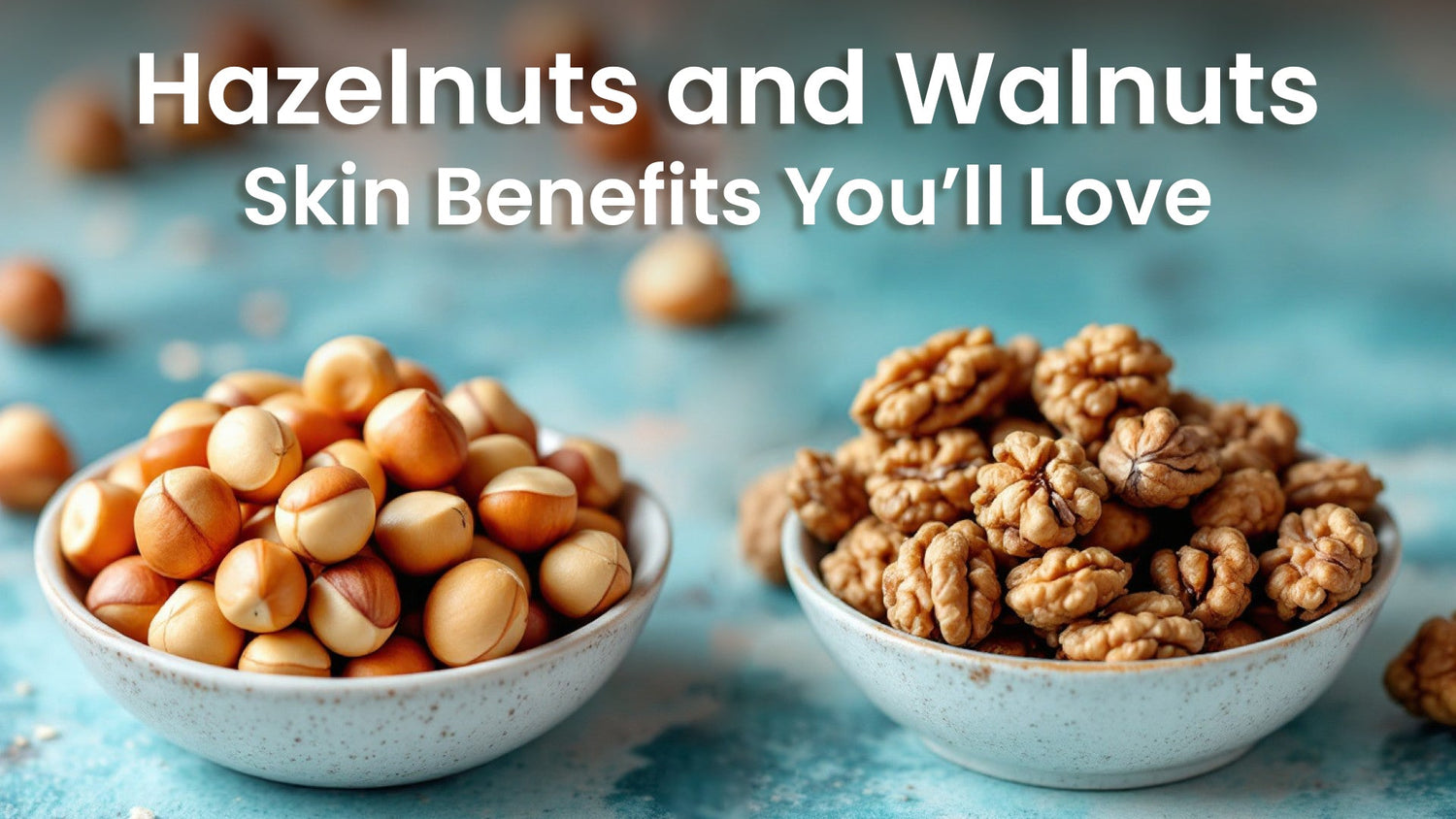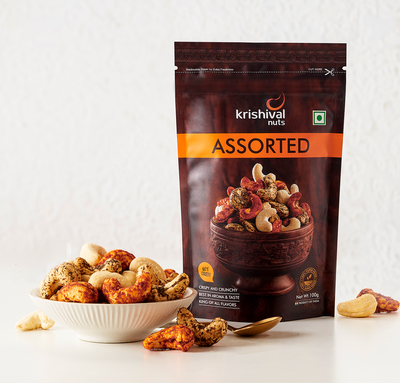
When it comes to skin health, both hazelnuts and walnuts provide numerous benefits due to their rich nutritional profiles. These nuts are packed with antioxidants, healthy fats, and vitamins that help protect, hydrate, and rejuvenate the skin. Regular consumption of these nuts can contribute to smoother, more youthful skin by boosting hydration, reducing inflammation, and supporting collagen production.
Both hazelnuts and walnuts offer distinct skin benefits, making them valuable additions to your diet. Whether you're aiming to improve skin elasticity, reduce the appearance of wrinkles, or protect your skin from damage, these nuts have a lot to offer.
Table of Contents
Shop Related Products
-
Introduction
-
Skin Benefits of Hazelnuts
-
Skin Benefits of Walnuts
-
Comparing Hazelnuts and Walnuts: Which Nut is Better for Skin Health?
-
How to Incorporate Hazelnuts and Walnuts into Your Diet for Skin Benefits
-
Conclusion
-
FAQs
Skin Benefits of Hazelnuts
Hazelnuts are loaded with nutrients that support overall skin health. One of the key components is vitamin E, a potent antioxidant that helps combat oxidative stress and protects skin cells from damage. This nutrient plays a crucial role in maintaining the skin's natural glow while preventing premature aging signs.
In addition to vitamin E, omega-9 fatty acids found in hazelnuts help nourish the skin and keep it hydrated. These healthy fats work to maintain the skin's barrier, locking in moisture and promoting a smooth, supple texture. Hazelnuts also contain zinc, a mineral that helps with tissue repair and inflammation reduction, promoting healthy skin healing and reducing acne breakouts.
The combination of these nutrients makes hazelnuts an excellent choice for maintaining healthy, youthful skin and preventing the signs of aging.
Skin Benefits of Walnuts
Walnuts are packed with essential nutrients that contribute to overall skin health. One of the key benefits is their high content of omega-3 fatty acids, particularly alpha-linolenic acid (ALA). These healthy fats help maintain the skin’s lipid barrier, which is crucial for keeping moisture in and preventing dryness. Walnuts also provide a rich supply of antioxidants, including vitamin E and polyphenols, which protect the skin from oxidative stress and reduce signs of aging, such as fine lines and wrinkles. Furthermore, walnuts are a good source of selenium, a mineral that helps to prevent skin cell damage caused by environmental factors like UV rays and pollution.
Another important benefit of walnuts is their ability to reduce inflammation. The omega-3 fatty acids in walnuts help control the production of inflammatory molecules in the body, which can help reduce the risk of skin conditions such as acne, eczema, and psoriasis. Additionally, walnuts promote better circulation, which enhances skin health by ensuring that the skin receives an adequate supply of oxygen and nutrients.
Overall, including walnuts in your diet can provide both internal and external skin benefits, helping to maintain a youthful appearance while promoting healthy, glowing skin.
Comparing Hazelnuts and Walnuts: Which Nut is Better for Skin Health?
Both hazelnuts and walnuts are excellent choices for skin health, but each nut has unique properties that offer distinct benefits. Let’s compare their nutritional profiles and how they contribute to skin health.
Nutritional Comparison
-
Walnuts: Walnuts are particularly rich in omega-3 fatty acids, which are essential for maintaining the skin’s moisture and elasticity. They also contain vitamin E, which protects the skin from oxidative damage, and selenium, which helps to prevent premature aging. The anti-inflammatory properties of walnuts are one of their standout features, helping to manage skin conditions like acne and eczema.
-
Hazelnuts: Hazelnuts, on the other hand, are a great source of vitamin E and monounsaturated fats, which help maintain skin hydration and promote a smooth texture. They also contain zinc, which plays a role in collagen production, essential for skin strength and elasticity. Hazelnuts are beneficial for protecting the skin from sun damage and environmental pollution.
Antioxidant Protection
Both hazelnuts and walnuts are rich in antioxidants, but walnuts have a slight edge due to their high content of ellagic acid and polyphenols, which offer strong protection against free radicals. These antioxidants help prevent oxidative stress, which can lead to premature aging and skin damage.
Omega-3 Fatty Acids
Walnuts are superior in providing omega-3 fatty acids, which are crucial for maintaining healthy, hydrated skin. These fatty acids help keep the skin’s barrier intact, preventing moisture loss and dryness, which is why walnuts may be a better choice for individuals with dry or aging skin.
Inflammation Reduction
Walnuts are particularly effective at reducing inflammation due to their higher omega-3 content, which can be beneficial for those dealing with inflammatory skin conditions like acne or psoriasis. Hazelnuts, while still beneficial, contain fewer omega-3s and may not have the same level of anti-inflammatory impact.
Which Nut is Better for Skin Health?
-
For hydration and elasticity, hazelnuts are an excellent choice due to their high content of monounsaturated fats and vitamin E.
-
For anti-aging and reducing inflammation, walnuts may be the better option due to their superior omega-3 content, antioxidants, and ability to reduce inflammation.
Ultimately, both nuts provide valuable benefits for the skin, and incorporating both into your diet can help you reap the full spectrum of skin health advantages. Whether you choose walnuts for their omega-3s or hazelnuts for their vitamin E, you’re giving your skin a powerful nutrient boost.
How to Incorporate Hazelnuts and Walnuts into Your Diet for Skin Benefits
Including hazelnuts and walnuts in your daily diet can be a simple and delicious way to boost your skin health. Both nuts are packed with healthy fats, antioxidants, and essential vitamins that nourish your skin from the inside out. Here are a few easy ways to incorporate them into your meals:
-
Add to Smoothies: Toss a handful of hazelnuts or walnuts into your morning smoothie for a nutty flavor and added texture. These nuts blend well with fruits, greens, and even yogurt, creating a nutrient-dense drink that benefits your skin.
-
Top Your Salads: Both hazelnuts and walnuts make great toppings for salads. Their crunch and mild flavor pair well with leafy greens, fruits, and vinaigrette. This adds not only texture but also an extra boost of nutrients for healthy, glowing skin.
-
Nut Butters: You can make or buy hazelnut or walnut butter to spread on toast, crackers, or add to oatmeal. Nut butters provide a rich, creamy texture while delivering essential fatty acids that hydrate and protect your skin.
-
Snacks: Keep a small handful of hazelnuts or walnuts as a snack. Both are portable and can be enjoyed anytime, providing an easy and healthy option to satisfy hunger while benefiting your skin.
-
Baked Goods: Add chopped hazelnuts or walnuts to muffins, cookies, or granola. These nuts enhance the flavor and nutritional value of your favorite baked goods, giving your skin a nutrient boost with every bite.
By incorporating hazelnuts and walnuts into your daily diet in these simple ways, you can harness their skin-loving benefits and nourish your body from the inside out.
Conclusion
Incorporating hazelnuts and walnuts into your diet is a natural and effective way to enhance your skin health. These nuts are packed with essential fatty acids, antioxidants, and vitamins that support skin hydration, elasticity, and protection against oxidative stress. Whether you enjoy them in smoothies, salads, or as a quick snack, adding these nuts to your daily routine can provide significant skin benefits. For premium-quality nuts, Krishival offers a variety of hazelnuts and walnuts that are perfect for nourishing your skin and promoting overall health.
FAQs
-
How do hazelnuts benefit your skin?
Hazelnuts are rich in healthy fats, including omega-3 fatty acids, which help maintain skin hydration and elasticity. They also contain antioxidants like Vitamin E that protect the skin from damage caused by free radicals and environmental stressors. -
What are the skin benefits of walnuts?
Walnuts are an excellent source of omega-3 fatty acids and antioxidants, both of which are crucial for maintaining healthy, youthful skin. Omega-3s help reduce inflammation, which can lead to fewer breakouts and a more even complexion, while antioxidants protect against premature aging. -
Can walnuts help reduce acne?
Yes, walnuts can help reduce acne due to their anti-inflammatory properties. The omega-3 fatty acids in walnuts help reduce inflammation in the skin, which is a key factor in the development of acne and other skin conditions. -
Are hazelnuts good for anti-aging?
Hazelnuts are rich in Vitamin E and antioxidants, which help fight free radicals that cause premature aging. Regular consumption of hazelnuts can promote smoother, younger-looking skin by protecting it from environmental damage and enhancing hydration. -
How can walnuts improve skin elasticity?
Walnuts are packed with omega-3 fatty acids and vitamin E, both of which contribute to improved skin elasticity. These nutrients help maintain moisture levels in the skin, reduce the appearance of fine lines, and support collagen production. -
Can I eat hazelnuts and walnuts every day for skin benefits?
Yes, incorporating a small handful of hazelnuts or walnuts into your daily diet can offer significant skin benefits. They provide essential nutrients that support skin health, including hydration, elasticity, and protection from oxidative stress. -
What is the best way to eat hazelnuts for skin health?
Hazelnuts can be consumed in many ways, such as raw, roasted, or as a spread. Adding them to smoothies, salads, or even making hazelnut butter is a great way to boost skin health without compromising on flavor. -
How do walnuts protect the skin from damage?
Walnuts are rich in antioxidants like Vitamin E, which help protect the skin from oxidative damage caused by UV rays, pollution, and other environmental factors. These antioxidants neutralize free radicals, reducing the risk of premature aging and skin damage. -
Can eating nuts like hazelnuts and walnuts help with dry skin?
Yes, both hazelnuts and walnuts are excellent for dry skin because they contain essential fatty acids that help improve the skin's moisture barrier. Omega-3 fatty acids, in particular, help lock in moisture and prevent dehydration, keeping skin soft and hydrated. -
Are hazelnuts or walnuts better for skin health?
Both hazelnuts and walnuts offer distinct skin benefits. Hazelnuts are particularly beneficial for maintaining hydration and smooth skin, while walnuts are great for reducing inflammation and improving elasticity. Incorporating both nuts into your diet can provide a wide range of skin benefits.











